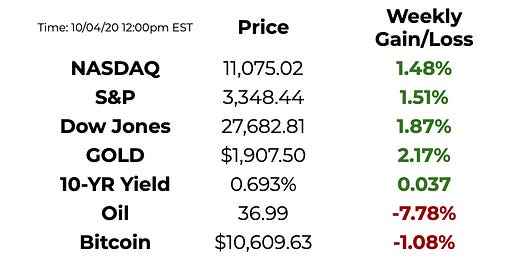Welcome to this week’s edition of the Myth of Money, a weekly newsletter on all things money, economics and technology read by 10,000+ subscribers.
Disclaimer: The following is not intended as investment advice. Do your own research.

“Is it just me or is it getting crazier out there?”
Early Friday morning, President Donald Trump announced that he tested positive for COVID-19. Within the next 24 hours, at least 12 others people associated with the GOP tested positive include:
President Donald Trump
First lady Melania Trump
Hope Hicks, senior adviser to the president
Bill Stepien, Trump’s campaign manager
Republican National Committee Chairwoman Ronna McDaniel
Sen. Mike Lee, R-Utah
Sen. Thom Tillis, R-North Carolina
Sen. Ron Johnson, R-Wisconsin
Chris Christie, former New Jersey governor who helped Trump with debate prep
Three White House reporters
One White House staffer
Kellyanne Conway, former White House senior adviser
The Rev. John Jenkins, president of Notre Dame University
The President had received experimental anti-body treatment Regeneron and anti-viral drug Remdesivir at Walter Reed Medical Center.
America and the rest of the world is waiting for additional news with bated breath. The GOP has requested that the Senate halt legislative work until October 19th, which means it will be weeks before we see a stimulus bill. The GOP does not want to delay the nomination of Amy Coney Barrett to the Supreme Court, however.
What Does This Mean for the Economy?
Expect lots of volatility on Monday. The uncertainty of Trump’s health and the delay in a secondary stimulus bill this close to the election is likely to cause a sell-off in an already inflated market.
[If you are looking to place a bet on volatility, VIXY and UVXY are popular ETFs that provide exposure to 1 and 2-month VIX Futures].
There are also concerns about the effectiveness of Quantitate Easing. A new academic paper from the University of Chicago looked at about 50 studies on the effects of asset purchases on growth and inflation. They found that researchers working in central banks tend to find a larger impact than academics and conclude that central bankers have incentives (such as possible promotions) to be too kind toward QE.
QE is a relatively recent economic experiment, the effectiveness of which is yet to be determined.
How Can Investors Protect Themselves?
Bridgewater put out a report recently encouraging us to place a bet on gold, arguing current price gains are modest, compared to what’s to come:
“Gold has rallied ~30% year-to-date against the dollar and a comparable amount against other developed world currencies, buoyed by fiscal and monetary stimulation of a magnitude unprecedented during peacetime…We’ve had a few such periods of extraordinary stimulus over the past century—all in times of economic depression, conflict, or both—and in all of them, gold saw triple-digit rallies that dwarf its recent run-up. ”
“At least in theory, the yield on paper money is what’s required for investors to accept the risk of holding a currency that can be printed away (while gold cannot), and the additional yield on risky financial assets reflects the compensation investors require for their incremental risk relative to cash. Today, the yields financial assets are offering to compete with gold are puny—not just real cash rates but also 10-year real yields are now negative, implying that bond returns will not keep up with inflation”
Millennial investors have used the exact same argument to invest in Bitcoin, particularly as financial analysts ring the alarm against the stability of the U.S. Dollar.
This Week By the Numbers
Although Friday’s news brought uncertainty to the markets, stocks finished the week green across the board. This trend is unlikely to continue next week, unless the President makes a swift recovery. Oil continued to fall as the second wave of coronavirus hit Europe, while Bitcoin remained stable around $10,500.

Top Stories
Branson’s Blank-Check Firm Expands IPO to Raise $480 Million
SPACs, as they gain legitimacy, have attracted other billionaires including Bill Ackman. Their wealth and success have become a selling point for drawing in investors. SPACs can also be highly lucrative deals that can quickly add to their fortunes. Although Branson is the founder, he isn’t a director of the company, according to the prospectus. The SPAC will target companies in consumer-facing industries in the U.S. and Western Europe, with a focus on businesses that provide consumer experiences in the sectors that Virgin Group already operates, according to its filings. Read Full Story.
Oil plunges 9% as major producers slash prices on demand weakness
West Texas Intermediate crude contracts for October delivery sank as much as 9.2%, to $36.13 a barrel, before stabilizing. Brent crude tanked as much as 6.7%, to $39.79, at intraday lows. The world's most traded commodity has fallen under new pressure in recent sessions amid signs that coronavirus fallout continues to weigh on the energy sector. Reopenings through the summer prompted a moderate rally and held contracts around $43 per barrel, but prices have since slipped on concerns the market may take longer than expected to bounce back. Read Full Story.
Airbnb nears IPO as Asana and Palantir land their direct listings
The going has not always been easy but the tech IPOs keep coming. Airbnb itself is almost here, in what is likely to be the ultimate stock market listing of this dramatic year. Now, news is leaking out that it could seek to raise up to $3 billion at a $30 billion valuation. Palantir, which is continuing to get political scrutiny around its government data businesses, and Asana both finished the first few days of trading without any pop to speak of for initial public investors. Read Full Story.
Coinbase Has Drawn a Line in the Sand for Its Activist Employees
Brian Armstrong, CEO of Coinbase, took a strong stance against employee-driven corporate activism over the weekend, explaining that, going forward, his company would be “mission focused.” That means Coinbase will devote all of its attention to achieving the goal of creating “infrastructure for the crypto economy,” but will eschew any kind of activism, and won’t take a stand on policy or societal issues that go beyond that mission. It’s clear that Armstrong’s post comes in response to some kind of employee movement at Coinbase rather than pressure from the outside. Read Full Story.
On YouTube:
In our second episode, I sat down with Changpeng “CZ” Zhao, Founder and CEO of Binance to discuss FinCEN, Money Laundering and Cryptocurrency.
Subscribe to the Myth of Money YouTube here.
Thank you for reading this week’s edition of the Myth of Money.🚀
Until next week,

By Tatiana Koffman
Hi there and thanks for reading. If you stumble upon my newsletter, you will notice that I write about money, economics and technology. I hold a JD/MBA and spent my career in Capital Markets working across Mergers & Acquisitions, Derivatives, Venture Capital and Cryptocurrencies. I believe in empowerment through closing the financial education gap and creating equality of opportunity for the next generation. Check out my articles in Forbes here.
Enjoyed your reading experience?
Follow me on Twitter.
Hit reply with your feedback and ideas :)
Share this post with others.
Tips: BTC @ 1MgfRn8NHnc8ZE5kBvNgYbgpTFShJh5mKK
Disclaimer: This email does not contain financial advice and was created solely for informational purposes.
Received this email by accident? Unsubscribe below.


